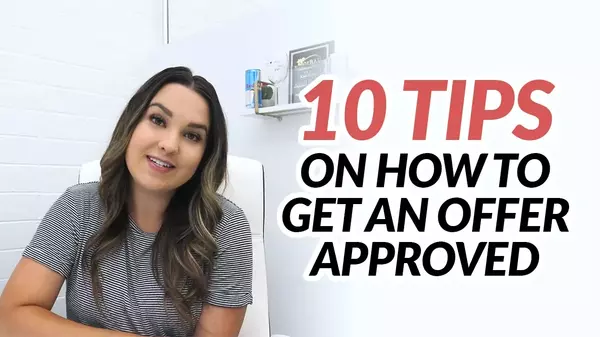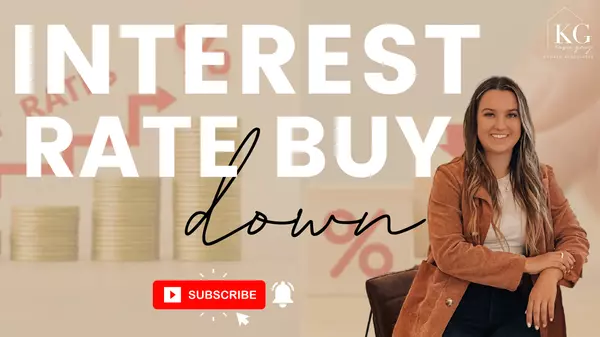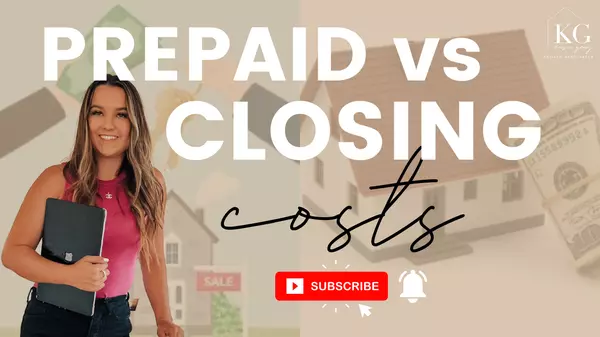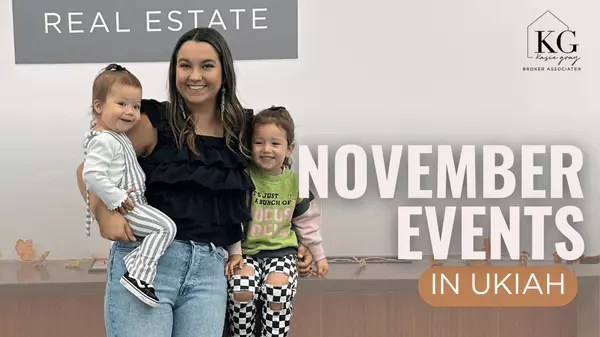THE GRAY METHOD
Your guide to the part of real estate that isn't very black and white. Buying your first home and upsizing into your dream home can feel very overwhleming. When you have endless options for how to navigate the process look no further than the expert.
FREE GUIDE
LISTING PREP GUIDE
Thinking about selling your home?Most wait until they are ready. My clients contact me months in advanced so I can give them a free consultation on steps to make to make sure you get the most value for your home. Get my free step by step guide here
FREE GUIDE
RELOCATION GUIDE
Looking to make a move? Here is my free guide that gives you the complete run down of the ins and outs of Ukiah. everything from my favorite meals, favorite parks and things I love to do in my free time. Take it all from me, a girl who has lived here my whole life!
FREE GUIDE

How To Get An Offer Approved? | 10 Tips | Ukiah Real Estate
This market is so challenging and I understand how you're feeling right now. Offer after offer but nothing's getting accepted. Here are some ways that you can get your offer accepted by me. Some ways that I help you get your offer accepted. So if you're interested stay tuned. If you haven't yet called me about buying a house, you should just hang up and walk. Call me right now anyways! Hi, my name is Kasie Gray, your homegirl, and broker associate here in Ukiah, and today I'm talking about how you can get your offer accepted. So these are my 10 tips for getting your offer accepted. If you're my client, there's lots more where this came from. So just pick up the phone, and give me a call first, I'll be one of the first to put to view the house and put in an offer. A lot of houses these days have offered you by dates which makes it a little bit more challenging but you want to get in to see that house as fast as possible, and if they don't, have a due date to get your offer in without any hesitation. They don't have a second to wait. Second is offering the above ask or including an escalation clause. I'll have another video up soon about what an escalation clause is but you know, you should just hire a professional to explain it to you anyway so I'll just leave it at that. Number three is to be open to an appraisal gap. So if you have a lower down this isn't might not be an option for you but you might need to waive the appraisal contingency. So a seller thinks that you have more skin in the game. What that does is if it doesn't appraise then you either have to come up with the cash or back out and give them your deposit. Number four speaking about deposits beef up your earnest money. So I cannot tell you how many times my clients have gotten denied offers because the earnest money was not enough. Look for anywhere from two percent and up to a put-down. It's you'll get it back as long as you have your contingencies but a seller wants to know that you have as much skin in the game as possible and you look more qualified when you have higher earnest money. Number five getting pre-approved by a local lender, not a bank, not quick in loans, not someone that doesn't work when they need to. What we're looking for is someone that's flexible, someone that knows the area, someone that understands how appraisals are going in around here, and so forth. It's super important to make sure that you check with your buyer's agent before you get pre-approved because chances are they have a team that they've worked with extensively who have done great transactions for them. So do not go to quicken loans because your offer will get denied. Nobody likes to work with quicken loans unless you're doing a refinance. So just don't do it. I'm just telling you now. Number six, offer to pay for the seller's moving expenses you know up to a certain amount but you know offer to help them out with a mover or whatever they might be looking for. Number seven defer all closing timelines to the seller so whether they need a longer escrow to need a rent back whatever it might be give it to them. That's sometimes that's the only way you can win in these situations especially if you have some flexibility in your schedule is to offer a rent back to offer flexibility for the seller so that they can go find another house to move to because no one wants to be homeless. So, if you're going to help them out with not being homeless, they're your guy or you're their guy you're everyone's guy everyone's got. Number eight waives the inspection contingency. So depending on if they have inspections already on the home you might be able to waive your inspection contingency. If you have other contingencies set up like a loan and appraisal that might be a little bit more appetizing for you. So that you still have the possibility to back out and get your deposit back but so it looks very confident to a seller that whatever this house has in store, I don't care. I want to buy it even if I need to install a new super lateral and put it on a roof. Those are the things that a seller wants. They want you to commit. Number nine, eliminate financing contingencies so your loan contingency is what saves you if for some reason you get fired you accidentally bought a new car whatever it might be. You can't get a loan anymore and now you can back out with getting your deposit back but removing that contingency. You can still back out you're just not going to get your deposit back. I mean they can't force you to buy a house but they could take your check from you. So that one definitely is careful with some lenders who can fully underwrite you before you even get into the contract which will allow you to remove that loan contingency. But still, you know consult with your team to make sure it's okay and they feel confident in it and you feel confident. Know the rules that you're not supposed to buy a new car on accident or whatever it might be and then you can do that. Number 10 has as much down as possible or as much cash as possible sellers love to see the cash. It just makes you a more qualified buyer it doesn't always necessarily mean that you're more dependent it's just what they see on paper. The bigger the numbers, the more confident it looks. So, like I said hire a professional. I've written so many offers in my career and I know what to look for what not to look for how to communicate with the agent and to try to how to try to get your offer accepted. I can only do so much but as a buyer, you know you want to have a really professional and seasoned buyer's agent so that they can get your offer accepted for you!

Interest Rate Buy Down | Ukiah Real Estate
A big topic that is currently going on is interest rate buy-down. So, I'm going to get into what those are what those mean and how they could help you or hurt you. Hi, my name is Kasie Gray, your homegirl, and broker associate here in Ukiah California and I love helping first-time sellers buy their dream homes. So, this is a perfect time to look into that move-up sale. There is a lot of potential for a move-up sale but some things that you'll want to know are about interest rate buy-downs. So essentially what that is is you pay a chunk of money to buy down a percentage of your interest rate now. I am not a mortgage lender, and I am not licensed in mortgage lending but this is just information that you can get from the online Google bestie that is on everyone's computer. So if you have more questions, I would love to refer you to a mortgage lender but this is a brief understanding from a normal gal's brain. So, buying down your interest rate is a one-time upfront fee. So it's a way to lower your interest rate by using some of that cash that you might have on hand each point costs one percent of the mortgage full. For example, for a three hundred thousand dollar loan, the point would be three thousand dollars, and each point lowers the interest rate by around a quarter of a percent. So one point would lower the interest rate from six percent to five point seven five percent forward the entire life of the loan. So this isn't just for the first five years, this is for the entirety of your loan whether that's 30 years or 15 years. If you've got some extra savings you don't have a ton of work that needs to be done to the home when you get into it and you have the ability to buy down the interest rate, it could be a smart investment. You can talk to your mortgage lender to run different scenarios for you at different interest rates with different payments to see what will work best for you. If you have any other questions about getting approved for selling your home about buying a dream home, it's never too late to give me a call!

Prepaid vs Closing Costs | Ukiah Real Estate
With all of the things that happen during the home-buying process, prepaid costs can sometimes be a surprise, and we don't want any of those. So you're in the right place to learn the difference between closing costs and prepaid costs. Let's get into it. Hi, my name is Kasie Gray, a Realtor broker, associate, and mom who loves helping families find their dream homes. Today, we're gonna talk about the difference between closing costs and prepaid costs. Your closing costs are your standard fees that come with buying a house, um, as a buyer. Those include escrow fees, title fees, title, insurance fees, and various notary fees if any. And lender fees, you don't pay for your realtor. Typically, as a buyer's agent, they get paid through by the seller, so that's not a closing cost fee that you have to worry about as a buyer. But there are various fees when it comes to closing costs. If you would like my free buyer's guide, that will be linked down below, but we're talking about prepaid costs right now, so let's get into that. Prepaid costs are going to be your initial escrow deposit, which is a chunk of money that you're going to put towards. The house, think of it kind of like a security deposit on a rental. Um, you give them a chunk of money. If you uphold your end of the bargain, that money goes towards your down payment. If for some reason you decide to back out while you still have contingencies or reasons to, you get that refunded to you. And if you go through with it, it goes towards your down. So that is a prepaid cost. Next up on the list is your homeowner's insurance premiums. So typically most lenders, depending on how much you're putting down, will want you to pay some prepaid and put some money towards your impound account. Your impound account will collect money for your taxes, your insurance, and your mortgage. The mortgage company will then pay out your insurance and taxes, but you'll make one payment to one place. So, it kind of wraps it all into one, which can be great for first-time home buyers or people who aren't so great at managing all of the different monies and funds and the places that money needs to go. So some lenders could wanna see up to six months. Or just three months depending on how much you're putting down. So that's a question that you're gonna ask your lender specifically. Um, but six months of prepaid insurance could be quite an index expense for most people. So that's the money you're going to make sure you have in mind when it comes to your prepaid. Next up is real estate property taxes. So, as I said, your lender is going to take the. From your payments and pay out those taxes and that insurance. But this impound account will hold the extra funds. So if you don't make the payment, they can still pay towards property taxes. Um, or if for some reason your property tax bill is more than you have expected, they can pay towards those. So that's a fee that you're going to wanna expect. Again, you'll wanna talk to your lender, but it should be around six months of property taxes and then mortgage interest. So depending on the lender, the type of loan, and, um, what you are, If you're buying down your rate, you could be paying towards your mortgage interest. So these are all the prepaid costs that are separate from closing costs, but kind of all wrapped in the same bubble. If you have questions about what kind of funds you're gonna need to have ready for buying your first house, your dream house, whatever it might be, I am here to run some numbers for you. Of course, free of charge. I want you to be aware of what that looks like, what the process looks like, and how I can help you!
Categories
Recent Posts










